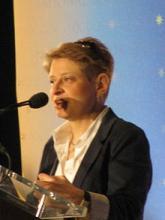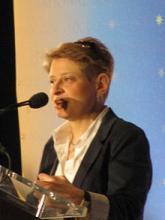An unbreakable bond
Quite suddenly, everyone has started looking at maps again. With energy prices spiralling out of control - and energy producing countries growing in confidence as a result - the great game of geopolitics has made a dramatic and unwelcome return. And with it, questions like 'Can you go from country X to Y without passing Z' have returned. Of course, the catalyst for this was the South Ossetia crisis - an event which has made it clear that the EU must also play the geopolitical game. And a glance at the map leaves little doubt as to where the next move should be made: Turkey.
On the 8th August 2008 the world changed. On that day two giants affirmed, or reaffirmed, their place on the political stage. One - China - did so with a smile, in the impressive opening ceremony of the Beijing Olympics. While the other - Russia - did so with an iron fist in the tinderbox of Caucasian nationalism. While the rise of China will, ultimately, prove to be the more important factor by far in shaping the world to come, it is Russia's newfound confidence that offers the most - and most immediate - threat to the EU.
The conflict between Russia and Georgia has been a great shock for the EU, even if the crisis was perceived differently throughout the 27 member states. For some it carried echoes of an all too familiar cold war mentality. While for others, it seemed like a prelude to a very hot war the like of which hasn't been experienced for generations. Across the EU, this event was a profoundly humbling experience - one that would prove deeply thought provoking and which should make the EU act more convincingly than has been the case for some time. What has become clear is that a strong and united European foreign policy is now more crucial than ever. While a common European energy policy is not just a complement to it, but an essential precondition for that to come about.
It is clearly Europe's dependence on Russian energy, more than anything else, that prevented the EU from taking more decisive and unified action. Some EU member states import up to 100% of their oil and gas from Russia, and Russia has been more than ready to exploit that simple fact. Russia knows very well that it has the finger on the button that can make the lights go out all over Europe. It is only by linking Europe's energy markets, and finding new sources of energy, that European nations can hope to tackle this geopolitical weakness.
That's where Turkey comes in. Those who have actually spent time looking at the map will know that all of the existing oil and gas pipelines to the south east of Europe run through Turkey, coming in through Georgia, from Kazakhstan, Turkmenistan and, of course, from Russia. Likewise, all projects aimed at importing energy supplies from those countries - but bypassing Russia - will have to run through Turkey.
Without a doubt, the unified European energy policy that is so desperately needed - both for economic and political reasons - will involve spending huge sums of money. It will also involve a great deal of resolve, as well as building closer and unbreakable ties with Turkey. What, then, is Europe waiting for? The rest of the world is certainly not waiting for Europe.
Football diplomacy
About six weeks ago, a most extraordinary thing happened. A man, and a busy man at that, went all the way to Armenia to see a football match. To me - not being a football fan myself - that's extraordinary enough as it is. But for most people the significance lies in the fact that the man concerned was Turkey's president, Abdullah Gül, and the nation he was visiting has, for as long as anyone can remember, been his country's arch enemy.
This bit of football diplomacy demonstrates that Turkey also knows the world is changing and that the centre of it is moving east. Turkey is also very much aware of its own potential role in this changing world and, in forming alliances, is willing to look to the future rather than the past. Neither is this an isolated event. In recent months, Turkey has been the driving force behind the Caucasus initiative; an effort to strengthen economic and political ties between all countries in the region. Certainly, the practical and political obstacles remain immense, but the symbolism is equally impressive.
The danger is that if Turkey's eyes are looking east, then it might well turn its back on the west. For at the heart of this strategic sea change, and even deeper and more fundamental than energy prices and economic rewards, there lies a strong element of disillusion. That reflects a sad but strong feeling that, for all its commitment, Turkey has not been rewarded for its loyalty to NATO and that, for all its enthusiasm, Turkey has not been well - or even equally - treated by the EU.
The country that has always prided itself as being the most eastern country in NATO - and Europe's bridge to the east - also fears that it has not been able to turn that pride into tangible power. Turkey suspects that Europe has not allowed it to do so. Should those fears take too deep a hold there is a danger that Turkey may instead focus on its other great attribute - that of being the most westernised Muslim country in the world, possibly leading it to forget about its European aspirations.
It is Europe's task not to let that happen. It is to Europe's benefit that Turkey should not be lost as a European state. And it is only through Europe's convictions and actions that the balance in the Caucasus will not be upset in the wrong direction. Ultimately, Turkish hearts and minds must be won back over to the European cause.
Over the last few years, however, Europe appears to have done the opposite. In the wake of the European referenda in France and the Netherlands, the EU has effectively been giving Turkey the cold shoulder. Europe has given the impression that, despite decades of promises, Turkey will never become an EU member - no matter what happens. It has been made to seem that, no matter how much further Turkey goes down the road to modernisation, and no matter how far it gets in meeting membership criteria, it will never be good enough. In fact, it's fair to say that Europe, as a whole, has been acting rather like an undecided lover - unwilling to commit and afraid to suffer the consequences. That just won't do anymore. The time has come for the partnership between Turkey and Europe to mature. It needs to become a permanent and unbreakable bond.
The meeting in Armenia is a sign that, for now, that bond is not as strong as it should be. The situation during, and since, the Georgian conflict suggests that the alternative - a Europe that isn't much of a force to be reckoned with in the Caucasus - is potentially a real and frightening outcome. With that in mind, and returning to the analogy of the undecided lover, the fate of so many immature boys should stir Europe into action: she will not wait forever.
Closing bridges
Certainly, these are troubling times. With so many states achieving significant levels of economic and political power, people are afraid that Europe might fall off the map. As so many of these international forces value the hard power of oil, guns and money over the soft power of enlightened ideals, democracy and institution building, then they are rightfully perceived as a threat to Europe's way of life and to the values and ideas that Europe stands for. Indeed, a potential threat to the very world view that has made Europe what it is.
So Europeans are right to be apprehensive. But it would be wrong to let fear paralyse action and that apprehension should not be allowed to force Europe into making the wrong decisions. Neither should it lead the EU to avoid making decisions, or into closing Europe off from what is happening in the rest of the world. Quite the contrary, Europe must fight for its place in tomorrow's world. And it is a fight that will be won, quite simply, because European liberal values and democratic ideals - in the end - are stronger than any power. That has proven to be the case in the past and so it will be again in the future.
In all this, and despite what the scaremongers throughout Europe try to maintain, Turkey is Europe's ally. As an integral part of the European family, sharing the same values, it is Europe's bridge to the emerging powers in Asia and - let no one forget - the Middle East. Even more than that, Turkey is a bridge to the Muslim world and it is the prime example that modernisation, secularisation and democracy are not anathema to Islam.
Turkey is, in short, an essential ally in the most important struggles that the world will face for years to come. So let Europe rise above its fears and be as great and as generous as this great game demands.
Copyright: Europe's World, 2008.
If you wish to comment on this article, you can do so on-line.
Should you wish to publish your own article on the Facts & Arts website, please contact us atinfo@factsandarts.com. Please note that Facts & Arts shares its advertising revenue with those who have contributed material and have signed an agreement with us.




















